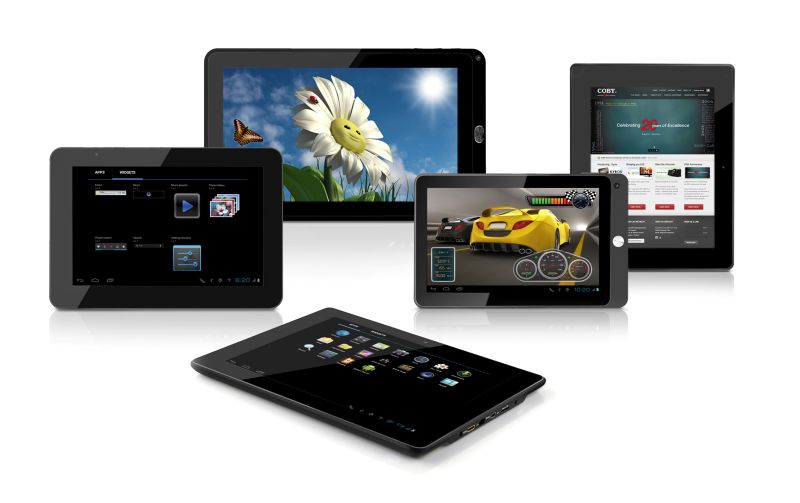HOME
TOPICS
ABOUT ME
Competition can be a stern master.
Al Fasoldt's reviews and commentaries, continuously available online since 1983

Coby's Android tablets come in a variety of sizes. The widescreen 7042, similar to the tablet in the foreground, was selling for a little over $100 a few weeks ago.
The iPad's domination is threatened by a tough competitor from Google
September 16
By Al Fasoldt
Copyright © 2012, Al Fasoldt
Copyright © 2012, The Post-Standard
Apple created the tablet market when it introduced the iPad two years ago. It also created an astonishing profit margin and helped propel Apple to the top. It's now the wealthiest corporation in the world.
Apple marks up its iPads by 100 percent, give or take a few digits. An iPad that sells for $499 costs Apple about half that to build. It's a sort of double-sided testimony: In one sense, those who buy the iPad (and other Apple products) know they're getting a long-lasting, good quality product with excellent customer support. But another way of looking at this is less charitable. These customers may be, as critics say, blinded by the light from Cupertino, choosing Apple's products simply because they want something trendy and don't mind paying a premium.
That premium is likely to be a thing of the past, at least for tablets. Apple can't compete that way any longer. There are no big secrets to designing and making tablet computers, nothing proprietary any longer -- nothing that requires huge profit margins and blue-shirted minions standing by white tables at glass-walled stores.
The way I see it, Apple's almost total dominance of the tablet market will be derailed not by a single competitor but by hundreds. They are the tablet manufacturers, big and small, that base their devices on Android, the free operating system supervised by Google. These Android tablet makers don't have to get Apple's permission to do anything. They can make tablets as large or small or powerful as they wish, with as many odd or cool or helpful features. They can even make Android watches and Android cameras.
I saw one Android tablet advertised the other day that had a 3-inch screen. Another that had a screen half the size of a football field, and yet another that looked like it belonged in a Barbie convention. Competition can work wonders.
It's that concept that should teach Apple a lesson it hadn't learned in the past. In all its years as a computer maker and, lately, a portable device maker, Apple has never had real competition. PC manufacturers turned out cookie-cutter PCs while Apple made Macs. No one could confuse a PC with a Mac. There was no direct competition.
Apple reigned as the king of small music players -- and still does. Microsoft sold an oddity called the Zune, which "squirted" music from one Zune to another. Nobody I know failed to laugh at the Zune, and it died. Apple made -- and still makes -- the best laptops. Nearly half of all incoming college freshman carry Mac laptops to school.
But the company's near-exclusivity in the tablet market can't last. Already, you can buy a 7-inch Android tablet from Google, the Nexus 7, for less than $200. Larger Android tablets costing $50 to $100 more will flood our shores in time for the holiday shopping season. Lesser, but still well made, 7-inch Android tablets are easy to find now at ridiculously low prices; I just bought a Coby 7042 tablet with all the features of Google's Nexus 7 for about $100.
Next month, Apple will introduce an 8-inch version of the iPad. Apple's expected to price this iPad (called, I'd guess, the iPad Air) at $300. But who wants to pay $300 when a Nexus 7 costs $200? Competition, as Apple is about to learn, can be a stern master.